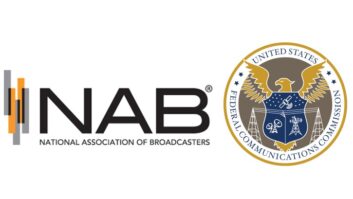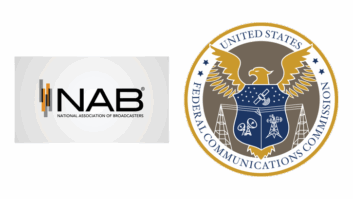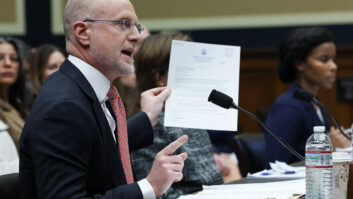The National Association of Broadcasters is giving the FCC an earful over that proposed increase in the regulatory rates that broadcasters pay.
Under the commission’s Notice of Proposed Rulemaking (NPRM) released in June, those fees would jump by approximately 13% this year. The regulatory fees are typically set by late August or early September and must be paid before the October 1 start of the government’s new fiscal year.
NAB says this year’s fee proposal exceeds the commission’s statutory authority and falls well short of achieving the commission’s stated regulatory fee goals, “by unfairly, unlawfully and disproportionately burdening broadcasters with subsidizing the costs of FCC activities that do not benefit them.”
The argument is similar to what the NAB has been saying for years: “The commission’s methodology of fee-setting needs revamping to make sure tech companies affected by FCC broadband regulations are paying their fair share.”
The FCC is required to collect fees that reflect the full-time equivalent (FTE) number of employees within the bureaus and offices of the commission. According to those familiar with the regulatory fees, said fees are adjusted to take into account the benefits provided to the payor of the fee by the commission’s activities.
NAB acknowledges in its latest comments the steps taken by the FCC a year ago to exempt broadcasters from certain broadband related costs. However, “this year’s fee proposal takes significant steps backward by abandoning the modifications and taking no action on the growing need to expand the base of payors to include the beneficiaries of the bulk of the commission’s primary activities – broadband internet service providers,” NAB wrote.
[Related: “U.S. Radio Stations Face 13% Fee Hike“]
As a result, NAB says broadcasters face “what seems like punishment and a fee increase that is more than six times the magnitude of the commission’s budget increase.”
The FCC is required to collect $381.9 million in regulatory fees for 2022 under appropriations approved by Congress and the president. The proposed radio fees range from $690 for an AM Class C in a small market to as much as $23,585 for FM’s licensed to major cities.
NAB argues broadcasters provide a free service and cannot easily absorb unjustified regulatory fee increases. “Broadcasters cannot simply pass along the extra costs to consumers,” NAB commented. “There is no subscriber base to whom they can pass on costs.”
NAB continued: “Although the regulatory fee process may be difficult and complex, the commission can and must do more to align fees with the benefits conferred on each industry group.”
The FCC continues to subsidize other companies by forcing broadcasters to pay for broadband-related activities that do not provide any benefit to broadcasters, NAB said its most recent filing.
The FCC’s NPRM seeks comment on the commission’s rationale for retaining its current direct/indirect methodology and whether it should use other calculation methods to reclassify FTEs when a category of licensees does not benefit from the FTEs’ work. It also asks how fee proposals “may promote or inhibit advances in diversity, equity, inclusion and accessibility.”
[Related: “An Open Letter to the FCC: Your Proposed Fee Hikes Are Not Grounded in Reality“]
The group notes broadcasters have been forced to pay for a portion of the 38 FTEs in the Wireline Competition Bureau that the commission determined were “working on Universal Service Fund (USF) programs that benefited certain regulatees in other core bureaus.”
NAB continued: “Rather than assign broadcasters a proportional allocation of these indirect costs, the commission should have, then and now, distribute them solely amongst those regulatees that benefit from the USF work. This ham-fisted approach is unacceptable in a system where benefits are the touchstone of whether it is appropriate to charge regulatory fees.”
NAB , which says the FCC’s budget has swelled by nearly $43 million the past two years to primarily support broadband activities, points out “the commission has admitted to Congress that 84 direct FTEs in the Media Bureau are working to promote a 100% broadband policy.”
Simply put, the FCC should add a fee category for broadband service providers, according to NAB, and explore additional fee categories.
[See Our Business and Law Page]
In addition, NAB asks the FCC to take steps to minimize the impact on small entities by increasing the de minimis threshold for small broadcasters, currently set at $1,000. The law allows the FCC to exempt a party from paying regulatory fees if the commission finds that the cost of collecting would exceed the amount collected.
NAB concludes its comments to the FCC this way: “To effect lasting and sustainable change, the Commission must no longer delay taking the steps necessary to modernize its fee structure, broaden the base of payors and seek necessary changes from Congress to make the regulatory system fair, equitable and sustainable for all regulatory fee payors.”
File comments in the FCC’s online system. In the Proceeding field, refer to MD Docket No. 22-223. Reply comments are due July 18.






